The day finally arrives…
After weeks of research, symptom documentation, and lab tests, you’ve finally been diagnosed with a thyroid problem and your doctor has written you a prescription for thyroid medication.
You are so excited to finally have an answer for the weight you’ve been gaining, the low energy you’ve been experiencing, your cold body temperature, your recent hair loss, and more.
You start taking your thyroid medication each and every day and patiently wait for your symptoms to resolve only to be met with disappointment.
Instead of resolving your symptoms, you actually feel worse on the very treatment that is supposed to make you feel better.
Instead of having more energy, instead of losing weight, instead of growing your hair back, you experience the exact opposite.
How can this be? How can you feel worse while taking thyroid medication even though it’s supposed to be the answer to your problems?
Well, it turns out there is an explanation as to why it happens and that’s exactly what we are going to discuss today.
Today you will learn…
- Why some people feel worse while taking thyroid medication
- How thyroid medication impacts your physiology
- The long-term effects of prolonged thyroid medication use
- And what to do if you are feeling worse on your thyroid medication
Let’s jump in…
How Thyroid Medication Works in Your Body
To better understand why thyroid medication can make you feel worse you first need to understand how thyroid medication works in the body.
Once you understand this simple physiologic process (1) it becomes easy to understand how it can become disrupted.
First things first:
Doctors only prescribe thyroid medication to patients who have low thyroid function.
This means that anyone using thyroid medication is doing so because their own body cannot produce enough thyroid hormone on its own.
This could be because your thyroid gland doesn’t work (2) or because your brain isn’t sending the right messages to your thyroid (3).
Where the problem is matters, but for the sake of this discussion, you just need to know that both problems result in the same thing: decreased thyroid hormone levels.

The thyroid medication that your doctor gives you is supposed to make up for that difference.
But there’s a big problem with this approach:
Your body was designed to have what are called feedback loops (4) built into it.
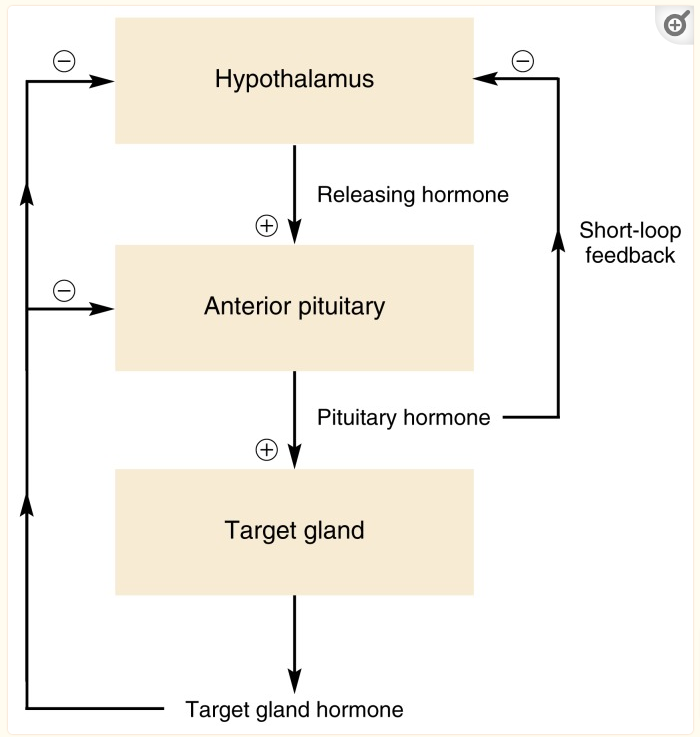
These feedback loops help prevent your body from creating too much of any one hormone and from the negative consequences that this could cause.
So when your doctor gives you thyroid medication (such as levothyroxine), it will have an impact on your brain via these feedback loops.
This happens because the body doesn’t know the difference between a hormone that it creates on its own or one that you are taking in a medication form.
Both types have the same impact.
The message that your thyroid medication sends to your thyroid gland is to reduce the natural production of thyroid hormone.
This effect is dose-dependent, so the more thyroid medication you take, the more profound an impact it will have on your body’s ability to create thyroid hormones.
This effectively means that you are replacing your body’s own thyroid gland function with the medication that your doctor is giving you.
This is okay, though, because it wasn’t working right to begin with so how can it cause problems?
How Shutting Down Your Own Thyroid Can Make You Feel Worse
It’s actually quite easy.
Let’s compare what the healthy thyroid gland does on its own versus what happens when you use thyroid medication to try and replace its function:
Consider these facts about the healthy thyroid gland:
- Your thyroid gland produces both T4 thyroid hormone and T3 thyroid hormone which are then converted into T2 and T1.
- Roughly 80% of the thyroid hormone that your thyroid gland produces is in the T4 form and 20% (5) is in the T3 form.
- T3 thyroid hormone is roughly 200 to 300 times more biologically active (6) than T4 thyroid hormone.
- When your doctor prescribes thyroid medication he/she is typically only giving you T4 thyroid hormone. This means you aren’t getting the same ratio of thyroid hormone that your thyroid would create naturally if it were working properly.
- The more thyroid medication your doctor gives you the less thyroid hormone your own body can produce.
This may seem a little bit confusing but consider this example to help it sink in:
Imagine that you are someone who has a thyroid problem such as Hashimoto’s thyroiditis which has damaged your thyroid gland.
A normal healthy thyroid gland may produce something like 100 mcg of T4 and 20 mcg of T3 each and every day (this is just an estimate but it’s a fairly accurate number for the average person).
But because your thyroid gland has been damaged from Hashimoto’s, it’s only functioning at 70% of normal.
So instead of producing 100 mcg of T4 every day, you are only producing 70 mcg and instead of producing 20 mcg of T3 every day, you are only producing 14 mcg.
This is a problem and it makes you feel worse (you experience all of the symptoms of low thyroid as we discussed above).
You go to your doctor and he/she provides you with a prescription for levothyroxine.
Because of the feedback loops mentioned previously, the thyroid medication you are taking shuts down the normal production of thyroid hormone from your thyroid gland.

Instead of producing 70 mcg of T4 and 14 mcg of T3 every day, which is what your unhealthy thyroid gland produced in this example, your doctor gives you a prescription for 100mcg of levothyroxine which contains 100mcg of T4 (7).
And here’s where the problem begins…
As you take this levothyroxine, you are replacing the combination of T4 and T3 thyroid hormones with T4 thyroid hormone alone.
Remember:
Even though your thyroid was not functioning optimally, it was still able to squeeze out 14 mcg of T3 every day.
But because you are taking levothyroxine, that production was shut off and replaced with 100% T4 thyroid hormone from the medication.
If you recall our previous discussion about thyroid facts, you will see why this is such a big problem.
As I stated, T3 thyroid hormone is roughly 200 to 300x more biologically active than T4 and is the most powerful thyroid hormone!
In effect, the use of levothyroxine has replaced the most powerful thyroid hormone in your body with a much weaker version but at a higher dose.
This mechanism is why thyroid patients can feel worse on thyroid medication.
Now the question becomes:
What can you do to fix this problem so that you actually feel good on thyroid medication?
Fixing The Brain-Thyroid Connection
In order to feel better on thyroid medication, you must address the brain-thyroid connection.
This brain-thyroid connection is usually referred to as the hypothalamic-pituitary-thyroid axis (8) or the HPT axis for short and is just a way to describe the complex relationship between your hypothalamus, pituitary gland, and thyroid gland.
Here I’ve just renamed it the brain-thyroid connection to simplify its name and make it easier to understand.
You can do that by following these 4 steps:
#1. Your goal should be to use the smallest effective dose of thyroid medication possible.
Remember:
Thyroid medication will reduce TSH (and the brain-thyroid connection) in a dose-dependent manner.
The more thyroid medication you take by mouth the more suppressed your brain-thyroid connection will be.
What’s the solution?
You need to use the smallest effective dose of thyroid medication possible.
This means you will want to avoid taking any extra thyroid medication if at all possible.
If your doctor slips up and gives you too much thyroid medication then you risk shutting down the brain-thyroid connection which may result in a drop in the highly effective T3 thyroid hormone.
You can keep a close eye on this connection by looking at your TSH, free T3, and total T3 levels.
These blood tests will help you understand how much T3 is floating around in your system and how suppressed the brain-thyroid connection is.
It’s worth pointing out here that there are situations in which suppressing the brain-thyroid connection makes sense.
One well-documented situation is the use of thyroid medication after thyroid cancer (9).

Another less common use is suppressing thyroid function temporarily to help with weight loss.
It’s okay to completely suppress the brain-thyroid connection as long as you are replacing both T4 and T3 thyroid hormones with medications.
While levothyroxine only contains T4 thyroid hormone, you can get T3 thyroid hormone from medications like Cytomel and liothyronine.
This allows you to replace the lost T3 levels from suppressive therapies.
#2. Take steps to naturally improve how well your own thyroid gland functions.
One of the reasons many thyroid patients end up on higher than necessary doses of thyroid medication is that they have problems directly in their thyroid gland.
These problems ensure that your own thyroid gland is not functioning as well as it can.
Even though you may have a condition such as Hashimoto’s thyroiditis, which is damaging your thyroid gland, doesn’t mean that you have to just let that damage continue.

You can take steps to reduce the autoimmune attack on your thyroid gland which has the potential to restore some thyroid function (this restoration depends on the severity of your disease state).
If you can salvage or naturally improve thyroid function, then you will need less thyroid medication.
This is why I’m such a big believer in natural thyroid remedies.
Even though they won’t necessarily cure or completely resolve your thyroid problem, even if they have the potential to help you by 5-10% (or more) isn’t that worthwhile?
The only time it may not be worthwhile is if the risks and costs outweigh the potential benefits.
But when we are talking about changes like eating healthier, sleeping better, exercising more, and replacing lost nutrients, it’s clear the cost-to-benefit ratio is very much in your favor.
#3. Provide your thyroid with all the necessary vitamins and nutrients it needs to function optimally.
Your thyroid gland requires at least 13 different vitamins and nutrients for processes like thyroid hormone production (10), thyroid conversion (11), thyroid cellular sensitivity (12), thyroid conversion in the gut, and thyroid conversion in the liver to occur.
Unfortunately, it’s not uncommon for thyroid patients to have suboptimal levels of many of these important nutrients.
This means your nutrient status may negatively impacting your thyroid function.

It’s my belief that all thyroid patients should ensure that these levels are optimal through lab testing or through supplementation or both.
In the majority of cases, it’s not harmful to take a thyroid-specific multivitamin that contains therapeutic doses of these important pro-thyroid vitamins and minerals.
I’ve spent a lot of time researching and formulating a thyroid multivitamin that takes all of these factors into account.
Even if you don’t want to use my formula, you should still take advantage of my research to see what I’ve included in it and at what doses.
While a thyroid multivitamin is a great starting point, there are plenty of additional supplements that can be used to specifically support and target various pathways necessary for thyroid function.
Some include:
- Supporting T4 to T3 conversion
- Supporting gut health with probiotics
- Supporting inflammatory pathways and immune health
- Supporting thyroid hormone cellular sensitivity
- Supporting adrenal health and cortisol balance
- Taking supplemental thyroid hormones
Supplements should never take the place of lifestyle changes, but they can be combined with these therapies for an added boost.
#4. Ensure that other pituitary hormones are functioning well.
The last thing you will want to ensure is that the other hormones produced by your brain are functioning optimally.
Your pituitary gland, the same gland that produces TSH, also regulates several other hormones.
Your sex hormones (estrogen, progesterone, testosterone), your adrenal hormones (cortisol), and even growth hormone are all regulated by the pituitary gland.
Cortisol, in particular, plays an important role in regulating thyroid function.

And if you have problems with the brain-thyroid connection then you can bet you probably also have cortisol or adrenal problems.
In addition, you might also find that you have problems with your sex hormones which are also being dragged down by your thyroid problem.
Unfortunately, fixing your thyroid doesn’t always resolve your other hormone imbalances which means you will likely need to address both independently.
There are natural and medical treatments available for these hormone imbalances just like there are for your thyroid and which you may need will depend on your situation so the first place to start is usually with testing.
Testing allows you to better figure out where your problem is coming from so that you can then address that problem.
How to Feel Better on Thyroid Medication
Last but not least, you should also take a hard look at what type of thyroid medication you are using.
Because let’s face it:
Levothyroxine is the most commonly prescribed medication but it just doesn’t work well for most thyroid patients.
As I mentioned above, levothyroxine contains only T4 thyroid hormone.
Other thyroid medications, such as natural desiccated thyroid, contain both T4 thyroid hormone and T3 thyroid hormone and more closely match the ratio that your own thyroid gland produces in a healthy state.
You should aim to use medications that more closely match the thyroid hormone production of the healthy thyroid gland because that’s how your body was designed to use thyroid hormones.
But don’t take my word for it, we have medical research studies that show that thyroid patients prefer these types of medications (13).
We also know that people taking these medications often have more energy and experience spontaneous weight loss simply when making the switch.
You don’t have to switch from levothyroxine to Natural Desiccated Thyroid medications like Armour Thyroid to experience these benefits either.
You can make your own combination T4 and T3 thyroid hormone by adding T3 medication such as Cytomel or liothyronine.
In addition, you can also add T2 thyroid hormone in a supplement form to any thyroid medication that you are taking.
Final Thoughts
I want you to know that you don’t have to accept feeling worse on thyroid medication.
There are things that you can do as a thyroid patient that will not only help you feel better but may help you reverse part or all of your thyroid disease.
This article includes several treatment options that you can take advantage of right away.
Now I want to hear from you:
Are you someone who started thyroid medication but felt worse?
If so, what side effects or problems did you experience when you started?
Were you able to make any changes to fix the problem or are you continuing to suffer now?
Are you planning on making any of the changes listed here or using any of my recommendations?
Leave your questions or comments below!
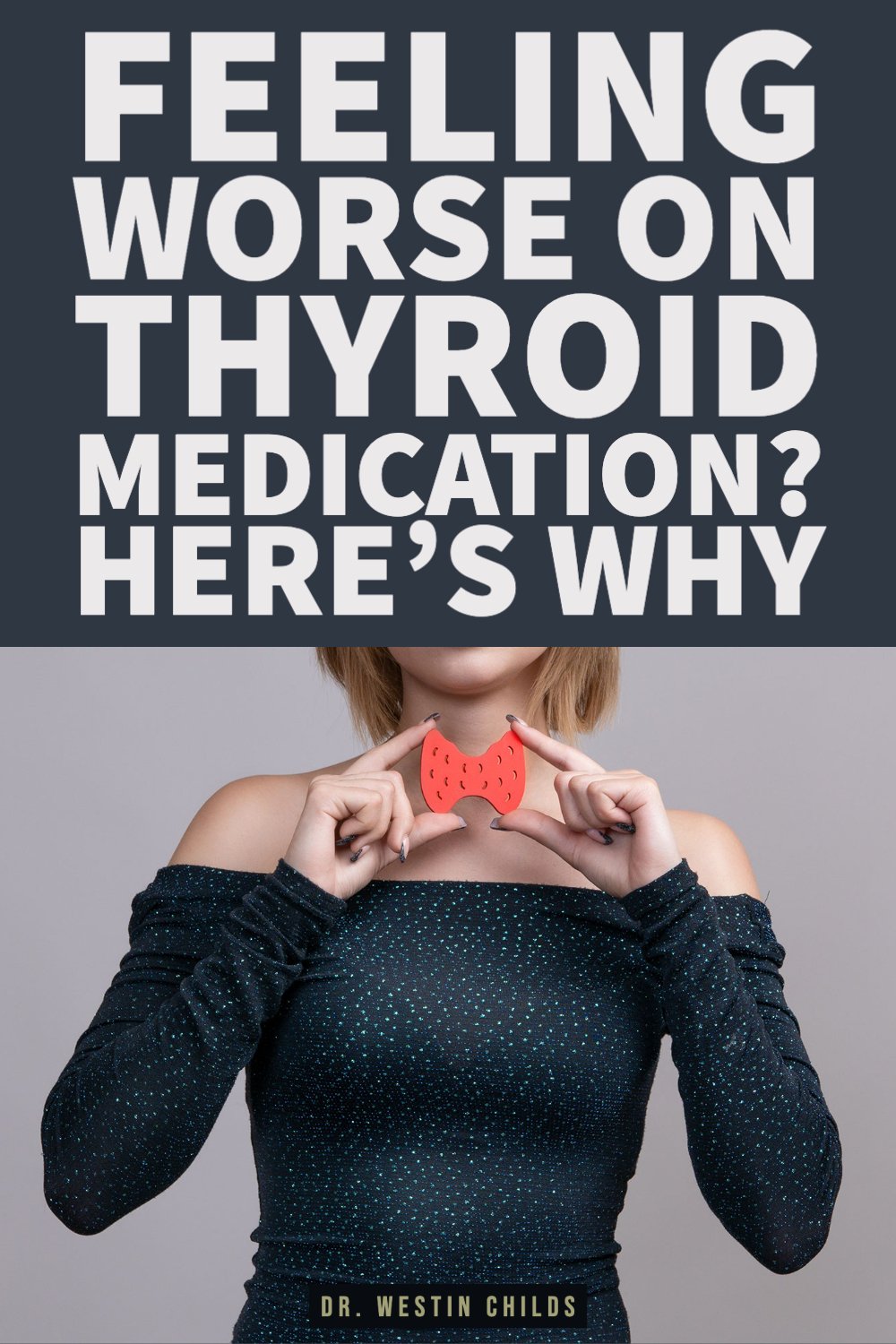
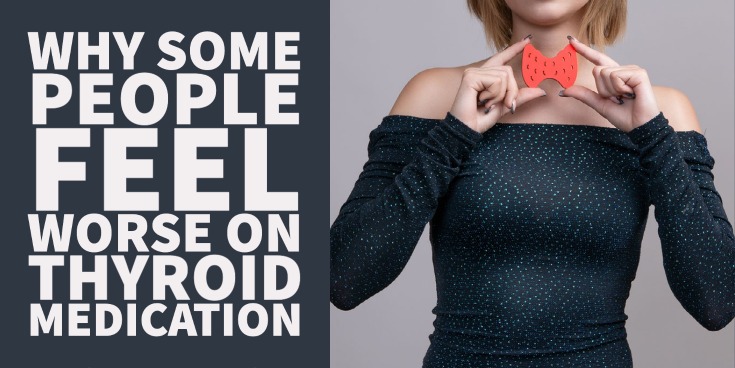
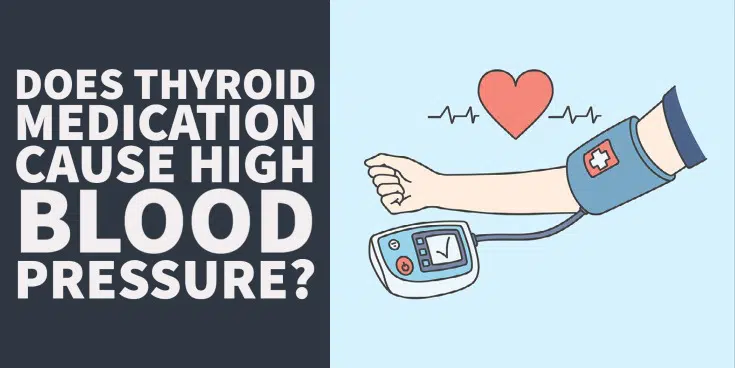
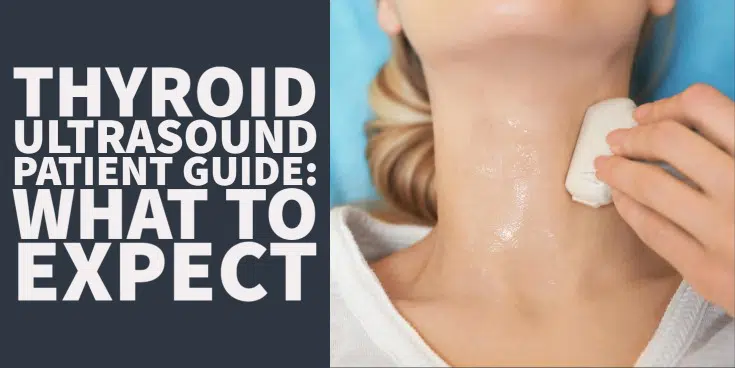

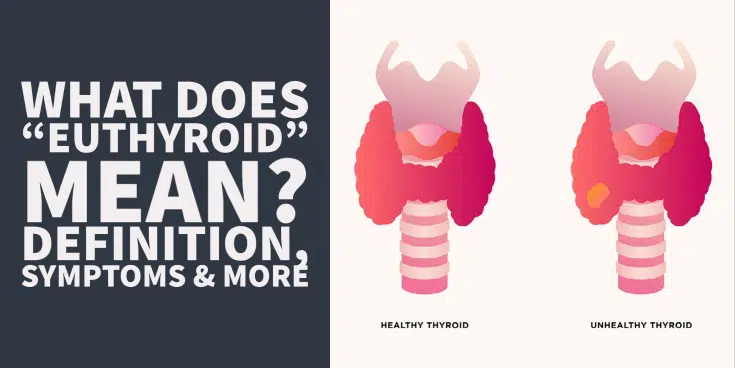

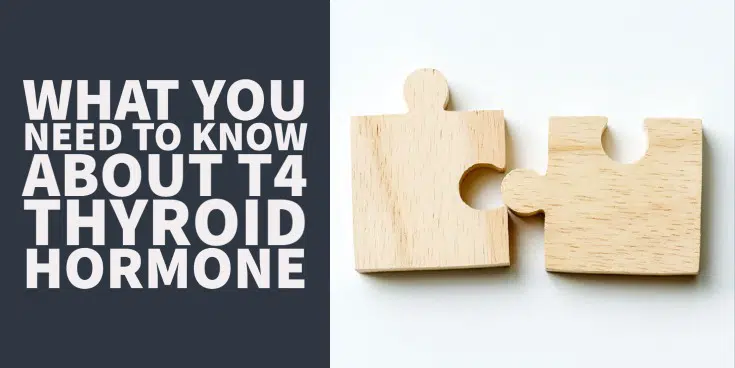

I still don’t know what to do about thyroid meds I’ve tried everything. Levothyroxine, euthyrox, compouned t4 and tirosint, they give me really bad migraines, rashes, pain in bones, extreme fatigue, water retention, depression, inability to tolerate heat. T3 only makes me so fatigued I can’t live a normal life and after 3 months the headaches from it got so bad that I had to stop. I’ve tried liothyronine, cytomel and thybon henning which gave me difficulty breathing. Metavive and Nature Throid both gave me extreme migraines and difficulty breathing and difficulty swallowing. Im in Sweden but I have to go to a private endocrinologist(public healthcare here only provides levothyroxine, they think every other medicine is bad). The doctor has no clue about what to do and neither do I, right now my TSH is 10(0,4-4,0), t4 14(10-22) and t3 4.3(3.3-6.0). Im on a lowcarb, gluten and dairy free diet, my vitals are better than before and I supplement with magnesium and multivitamin daily.
have you ever had your adrenal glands tested, like cortisol? Magnesium can lower cortisol levels, and you need cortisol to handle your medication, cuz the medication also helps clear cortisol faster. I’d stop the magnesium and get tested for cortisol.
Three years ago, I had no hypothyroid symptoms. After a blood test, it showed the deficiency. Once put on meds, the symptoms started to appear – weight gain, hair loss and lethargy. Doctor wants to keep raising dosage. I am debating just going off meds completely to see what happens. I am beside myself.
I had ecaxtly the same. I started levothyroxine, gained weight and lost hair. How are you now ? I would love to know. I am looking for a naturopathic doctor but they are all booked for the next month.
I have Hashimitos. My Dr put me on Armour Thyroid and I never really felt better so it was increased and I began feeling a little better. It was increased to 135mg daily and I starting feeling so tired an hour after I took it. I couldn’t even keep my eyes open. I kept being asked if I was depressed or not sleeping good. I turned down any medications for either of the above. I stopped taking Armour and I felt 100 % better. Its been a month and I just starting feeling cold and my hands like ice. I know its not safe not to take medication and am looking for a new Dr. Besides my hands freezing cold I feel better not taking medication.
I have no thyroid and have been on Levothyroxine for 9 years. I have not been the same person since and suffer to the extreme with just about every side effect you can mention. You name it I get it.
It’s that bad. The worst being pain in my bones and joints and severe facial abscesses/boils. All I have done is constantly changed dosages and brands. I am currently on Eltroxin which seems to leave some side effects behind.
I am following your guidelines and increasing my medication. I was on 100mcg for 6 days and 150mcg for one day. I am now taking 150mcg for 3 days and 100mcg for 4 days. I have more energy and yet to head to my doctor and get some full on bloods like Dr Westin Childs has recommended.
i have taken this levothyroxine for years and i feel it is causing me depression,could this be true?
Hi Virginia,
Yes but probably not in the way you are thinking. I would recommend reading this article: https://www.restartmed.com/hypothyroidism-and-depression/
Levothyroxine had me suicidal so yes, your depression could definetely be linked to your meds. Each day I felt more and more depressed, if I reduced my dose I felt less depressed. Then I went off it and haven’t been suicidal since then.
I had one of my parathyroids removed and one half of my thyroid in 2019. I was diagnosed with hyperparathyroid. I have continued to gain weight, still losing hair and still feel fatigue. I am taking 75 mcg of Levothyroxine. Would having a complete hysterectomy when I was 28 and now I am 70 years of age also create issues of not enough hormones and add to the issues of hypothyroid which is now what they say I have. I have gone from a size 6 to a 10-12. Thanks
Hi Dr. Childs,
2things I really need advise on:
had blood and 24 hr urine for iodine and low end blood and proper amount in urine so…. shouldn’t I continue kelp but Dr Christanesen says do not ingest any iodine even if from whole food?? But I am low in blood and ok in urine test?
My tsh last test was 26, f t3 4.6 high, t3r-11, ft4-1, cortisol am 17, tsh ab-neg, anemic,r and w blood cells low ( kidney congestion?) vit a- below normal, mag-6.5 high,,tpo 74,
dont want to take more armour at 6 15mg tabs day. natural doc said take 4 and 3 tsps of kelp. can you help sort this out? organic iodine ok to ingest and lower armour even if tsh is 26 and take more kelp? Many many thanks Email us: Click to view address
I was given the I131 pill in 1997. I was shaking so bad the nurse had to hold the glass of water for me the swallow the pill. I take .88 synthroid . I have hot flashes and get depressed.
My wife is having thyroid problems and feels real bad
Blood work shows the T3 reverse value at 16, Tsh at 1.66, T3 free value 2.6, T4 free value 1.1 . She is taking T3 SR 20 MCG every day for the last 3 months. Feels very bad.
I am currently taking 75mg of tirosint and 5mg of cytomel. My tsh levels are normal and although I’ve stopped gaining weight, I haven’t been able to lose the extra 20 I’ve gained since diagnosed.
Hi,
My story is long, (as is this post..sorry) but similar to the ones above. First off, I never had any hypothyroid symptoms way back in 2007. Blood work showed I was hypo though. I can tell you that it was only then, once I actually started thyroid meds, that many “hypothyroid” symptoms suddenly occurred. And I’ve haven’t been the same since.
After going off of them, I’d feel much better…but then symptoms would come back. It’s been a long, vicious cycle over the years because I’ve tried so many different thyroid meds, synthetic, generic, desiccated, T3 etc….over and over, and just cannot tolerate any of them. So I’m usually not on any. Feeling like crap..again..I recently got labs done. My TSH dropped from 12.9 to 8.3 —which is the highest it’s ever been. It usually hovered around 4.5-5 for many years. My Free T3 and Free T4 are always in normal range. I’m working on upping my Vitamin D even more, as it’s still pretty low, which I know is strongly linked to hypothyroidism. Anyhow, what’s a gal to do?!? What does normal even feel like anymore?
Thank you, in advance. 🙂
I feel that you have not been honest. I was expecting to see the
foods you said you were going to tell us not to eat ! Then all the other stuff appeared. I am not going to look any further.
Hi N. Bailey,
I’m not really sure what you are referring to. This blog post is about why people don’t feel better on thyroid medication.
I was prescribed Armour thyroid 30 mg to start. Before I had been in levo 75mcg but I had weight gain and I felt bloated 24/7. I began taking cynomel on my own which I bought in Mexico since I didn’t have insurance. I felt somewhat better but no weightloss either. If anything more weight gain. I finally have insurance again so I’m on Armour thyroid and dr decided to have me try bupropion 150mg to help with weightloss. I began having horrible headaches after almost 2 weeks taking it and Armour. I like being able to be up all day and do things that I normally wouldn’t do before but I was getting hungry taking bupropion. I stopped taking Armour and just took bupropion and felt so good and 100% normal. Unbelievable but I have been gaining instead of losing. Now I have no idea what to turn to.
Hi Laura,
I have plenty of resources to help thyroid patients lose weight 🙂 Check out those posts for more information. https://www.restartmed.com/best-thyroid-medication-weight-loss/
Be a little specific cause been ill too the more use the meds the more im having flu and fever sore eyes .I dont feel like using meds anymore I was better of them really .In 2022 january at Gyneocologist it was tsh 37.8 and february ,tsh12 and may tsh, 8.70 now with using eltrixin it went to tsh , 66.70.im confused and cold and sore throath and sick with Flu and a cyst in arm.Cyst on my thyroid 4 and doctors dont care espescially goverment doctors.
But if only it were that simple? TSH is not fully suppressed with a dose of 100mcg T4. Exogenous T4 is, according to prevailing medical wisdom, additive, and only *partly* suppressive, to remaining endogenous production, no? A full replacement – TSH <0 – dose of T4 is somewhere between 200-300mcg daily, as indicated in thyroid cancer.
I'm sure there is something in what you describe, but highly understudied and likely very idiosyncratic to each patient, i.e simple it is not. Does lowest effective dose work for some and full replacement work for others..?
Hi Jay,
You can suppress the TSH with virtually any thyroid medication but that’s not really what matters. What matters is whether or not that thyroid medication, whatever you chose to use, can be used by the body.
300mcg of levothyroxine is just as useless as 100mcg of levothyroxine if your body can’t convert it.
I am in the UK, my gp only prescribes levo and only does tsh from thyroid panel.
Current bloods: tsh: 2.4mu/L (0.30-4.20), ferritin: 23 ug/L (28-200), Serum inorganic Phosphate: 1.83 mmol/L (0.80-1.50), Plasma parathyroid hormone: 9.1pmol/L (1.6-6.9), Hba1c: 47mmol/L (20-41), Vit d3: 50.6 nmol/L (50 plus).
Currently take 100mcg Levothyroxine, cholecalciferol 400 unit/calcium carbonate 1.25 – 2 bd and cholecalciferol 1000unit – 1day. Forceval multivit, 12 weekly b12 injections, Ramipril 2.5mg and just started on ferrous sulphate 3per day. Feel really lethargic, weight gain, can’t lose even an pound of weight. Brain tiredness. Any advice gratefully accepted.
Wow! Time after time, the stories seem to be the same. I started studying nutrition to try to help myself. I completed my certification and there are still so many missing links in terms of understanding and regulating thyroid function. When I stopped taking Levothyroxine for 10 months in 2020, during lockdown while teaching seven groups of grades 7-12, single parenting (my husband moved before us, now we are back together). Anyway, if I am saying all this is because even though I was facing never seen stress conditions in my life, I was also meditating, doing yoga, eating super clean, 80% vegetarian + good fats & lots of fish, I had enough energy to do all I needed to do, and you bet I was tired, but I was also feeling great!
By recommendation of my OGB, I resumed taking Levothyroxine before moving to another country, I took enough for 3 months with me. And then, I had to start over: new country, new city, new family doctor… not only did I not find openness to order a complete thyroid panel. It was like hitting a wall. The new doctor prescribed 88mcg of Synthroid and I have never felt worse in my life (at least since I was diagnosed with Hashimoto’s). It as if all the symptoms were showing up in a row to complete the checklist. Symptoms I did not have for almost a year, started to show up. So, what’s going on with medical care these days?
I decided to do more research and take matters in my hands again. I am taking so many supplements right now because I deserve to feel better. Apparently, my conversion from T4 to T3 is still quite good and I am just waiting for results on my Reverse T3 test.
This guessing game needs to stop. Too many people, specially women, are suffering from this condition and there are not enough up-to-date doctors to help us all…
Thanks Dr. Childs for all the valuable information you give! I don’t live in the US and I don’t think I can even get Tirosint to give it a try…
Hi Zandra,
I’m glad you find the info helpful!
I don’t have a thyroid and I been on Tirosint sol for about two years . I have had all kinds of.problems, I have taken synthod.i wanted lev in generic but my doctor will not change. This medication has harm just about every part of my body. I dream a lot and grit my teeth, it like my nervous system. now my testosterone is high. I don’t know what to do. I changed doctor still no help.
Hi Addie,
It would be worth considering swapping medications entirely or combining both natural therapies with your thyroid medication.
Hello Doctor Childs,
I have found all of your info. to be invaluable. I have researched over the past month everything I can on thyroid function from your material and other resources. I thank you for your continued talks and articles available. Its helped me become my own doctor. Its helped me take control of my opportunity for health.I have supplemented my diet with supportive foods, and vitamins and mineral supplements to especially support thyroid function. I also took the desiccated thyroid beginning with the lowest dose. After 6 weeks my energy is beginning to climb. Is a slow go but I know patience is a part of this journey. My Doctor is working with me and considering extra test I have requested. I have showed him such charts that you have provided! I did visit an endocrinologist who proved to be arrogant and uncooperative, and refused to prescribe the desiccated thyroid.! She also did NOT approve of vitamin and mineral supplements. She spoke nothing of diet. Many of my decisions to get to the right place for healing is due to the knowledge you share. So thank you so much for your articles, chats, research, charts, diet suggestions…..the list goes on. You have helped me to find answers and take unravel myths about disease.
L
Hi Lynda,
So glad to hear that they are helpful! Thanks for sharing and it sounds like you are definitely heading in the right direction.
I feel tired especially right after I eat. I am only on
.05mg Levothyroxine. Is it true that it may not be my Thyroid, it may be something causing my thyroid to not function properly? Could it be from leaking gut syndrome? Should I take a probiotic?
Hi Jeris,
It is true that it could be virtually anything including your gut, liver, or thyroid. It’s best to get a full set of labs to help direct the treatment if you don’t know for sure what the issue is. If you know, for instance, that it is your gut, then you could start with probiotics.
Nothing works for me and I dont know what to do since no doctor will look into solutions for me. I was on levothyroxine for a year and a half, side effects got worse and worse. I had hot flashes, pain in my body, rashes, extreme heart palpitations, diarrhea every morning. Doctors wouldnt listen so I tried to reduce my dose but then got severe migraines, so bad nothing helped and I had to be on bedrest for the rest of the day. This was 2019 and I’ve tried several brands of t4, the same thing happens and I get a feeling of being drunk. I’ve tried ndt bovine and porcine with the same reaction and I get difficulties breathing. On t3 only I get so tired, I stuck it out for 3 months but then started getting daily severe migraines. I have hashimotos and live in Sweden and the doctors just say if you get these side effects it is what it is. What am I suppose to do? T3 is low, t4 just above range and tsh is between 10-20. Literally no doctor will investigate why this happens and most of them tell me to take my levothyroxine otherwise they cant help me, but I cannot take it but they wont listen.
I suddenly can’t take my meds t3/t4 as of a few months ago. After 2 years of being stable. I also feel drunk, brain fogged and my blood pressure goes up when I take my meds. The endocrinologist says it’s not medically possible for that to happen. My tsh is at 39.
I feel great! But for how long? I wonder if I’ll eventually die from no meds. Scared.
Hi Rachael,
It’s definitely possible for your dose to change over time, but not usually by as much as you’ve mentioned here. You can read more about this concept in this article: https://www.restartmed.com/you-cant-stay-on-the-same-thyroid-medication-dose-forever/
Is it ever wise to stop taking synthroid and just monitor hashimoto? I’ve been off about a week because I had too high a dose and was having terrible palpitations, trouble breathing, etc. while my doctor was out of town. Out of desperation I just stopped it til she returned. Surprisingly I feel better than I have in a long time. It could be coincidence but after 20ish years on meds I wonder if I’m doing better without. I’m supposed to start it again within the next few days at a lower dose but I’m not too excited about it. I am also having my cortisol levels checked. My cortisol blood levels show high. My T3 and reverse T3 show about mid normal range. Any advice?
Hi Ashley,
It can be a good idea, in the right setting. It’s not always a good idea, though, so be cautious in doing so. It takes about 4-6 weeks for the medication to leave your system so you won’t know if you are doing well until that time.
Thank you Dr Childs for all your info. I am wondering if the medication is the cause of all my symptoms. I never had any symptoms prior to taking Levothyroxine. I was only put in it because my TSH was 4.5. I don’t know what my T3 and T4 were I didn’t know that was a thing. I can say that since I have been on Levo I have been gradually getting worse. Is it wise to go off the med and see how I feel?
Hi Margaret,
It wouldn’t be wise to go off of your medication without physician supervision but it may be worth a trial to see if you feel better by doing so.
I have Hashimoto’s. I’ve always taken NDT, for years I was on Naturethroid until it was recalled. Armour and NP thyroid made me feel terrible. I’m now taking a compounded medication and really feel terrible! I’m exhausted, have headaches, body aches, neuropathy, dry mouth, insomnia, frequent ruination at night. I need help!
Hi Kristin,
I would recommend checking out the therapies listed here: https://www.restartmed.com/natural-thyroid-remedies/
I was put on Thyronorm 25mcg since my tsh was 8.23.
I started feeling chest pain ,rapid heartbeat after 15 days of starting the medication. My doctor has advised me to stay off the medication for a few days. I do not want to take it anymore. Also have well controlled diabetes. Taking Janumet 850 for that.Is it alright to not take the thyroid medication?
Hi Parveen,
I’m not quite sure I understand the question, can you please clarify?
When I take my thyroid meds which is 45mcg T3 compounded w/ T4 20mcg I get extremely cold hands that last all day. This is a slow release medicine. I don’t know if this is pushing me more into hypo or what. My hands weren’t even this cold before meds. I mean right after I take it my hands feel almost numb they are so cold. Any ideas?
Hi Gypsy,
Please see this article which outlines the pros and cons of SR T3 medication: https://www.restartmed.com/sustained-release-t3/
My boyfriend was recently diagnosed with hypothyroidism started on 50mg. Felt no better, more blood test shows his levels are worse so doc upped his medication to 100 MG. Has gut issues, sweating at times (dripping wet), dizzy, always hot, hwadaches and severe fatigue. He has always been tired but this past year it has gotten severely worse to the point out of 24 hours He was awake for only 2. Any ideas?
Hi Tara,
Yes! Make sure he gets a full thyroid lab panel and also gets his testosterone level checked. You won’t really know what’s going on without testing all of those hormones. You can learn more about which tests to order here: https://www.restartmed.com/thyroid-tests/
I recently started taking 50 Mcg of Levothyroxine and recently noticed that I seem to pass a lot of gas or feel like I am going to pass gas, this is embarrassing, could the medication be causing this?
Hi Carol,
It could be, some people are quite sensitive to lactose and lactose can be found in some formulations of thyroid medication.
Hi Dr. Childs,
I have been diagnosed with Hashimoto’s for many years but my TSH was always within limits. But for many years I was on a GF and mainly dairy free diet and did fairly well. I mean, my hair is thinning very badly, but still did okay. But recently due to a life change, I’ve had to stop my GF/DF diet. My TSH went up to 6.5 and I was put on 50 mcg of Tirosint. It’s been 7/8 weeks now and I cannot tolerate the meds. I feel jittery, I feel hotter than normal, my heart rate is slightly raised and I can’t think straight, I also can’t sleep very well at all. The very worst symptom is “air hunger”, I simply cannot take a deep enough breath. It’s very disconcerting, and although my Dr. tells me that it cannot be the meds, I have a difficult time understanding why. Before I started the meds, I did not feel these symptoms. I will have to stop them because I need to function in my daily life. The symptoms are that extreme. Could It be that’s it just too high of a starting dose? I’ve asked that, and was told that I should be given even more since my TSH only went down to 3.67. Anyway, I’m at a loss and I’ll be forced to stops the meds, because I just cannot live like that. Thank you!
Hi Tea,
Air hunger is certainly not a typical symptom of thyroid medication but you could be that 1 in a million case where it occurs. Without going off of it, though, there’s no way to tell for sure. It’s unlikely your starting dose was too high given your TSH but that’s always a possibility as well (though unlikely, statistically speaking). It’s more likely that you are just sensitive to thyroid medication. I’ve met a handful of people who respond to very small doses as if they were 10x the dose they were given.
Thank you so much for your response. I have been off of all thyroid meds for over a week now and I feel sooo much better. That’s so frustrating for me. According to my numbers I need meds, but I feel better off of them. Now, I’m beginning to wonder if cortisol might have something to do with it. But I will dig deeper and see if I can restart the meds sometime in the future. Thank you again.
Hi Tea,
Happy to help! Cortisol can definitely play a role in impacting thyroid function so it would be worth looking into.
I had my thyroid ablated when I was 17. I’m now 34 and have battled sluggishness, sore calves, extremely thin hair, and nervousness/depression. I’ve literally lost half of my life to this. I’ve seen a few endocrinologists that only want to play with my doseage. In the last 2 years I have not had anyone check my T3. We run the basic tsh and t4. I’m at my worst right now I think. Every doctor says they are different and will run every test until we find the issue! But its always the same ones. I’m wondering if I try the t3 conversion booster if it would alleviate some of my symptoms. I’ll never get anyone to test for it they all say there’s no need. I’m willing to do whatever I have to on my own. I’m losing my best years to this.
Hi Brittany,
Unfortunately, you aren’t alone. T3 conversion booster will likely help but once your thyroid has been removed/ablated you are more reliant upon thyroid medication than the average thyroid patient. This means you will need to optimize your thyroid medication from someone who knows what they are doing in order to get back to 100%. You can read more about how to find the right type of doctor here: https://www.restartmed.com/how-to-find-a-doctor-to-treat-your-thyroid/
Hi, really good article. I have hypothyroidism, I also have Coeliac disease & Sjogren’s, I also suffer with MANY food, supplement and medicine intolerance’s. Was diagnosed with HT back in 2012 and given Levo. Within 3 months I complained of brittle hair, hair loss, dry and flaky skin and brittle nails. I had never suffered from weight issues pretty steady at 120lbs at 5’5″. I lost weight on Levo down to 115lbs and then last year 2021 was diagnosed with Coeliac and lost more weight, down to 108lbs when I eliminated gluten. I finally weaned myself off Levo completely in November 2021 and for a year have not taken any medication.
This past December 2022 I went to a new endocrinologist and she tried to put me on brand name Synthroid. Within the week I started losing my hair again, my anxiety level shot up 10 fold. I stopped the medication. She suggested Armour as an alternative. I’ve been on it for a week and again shedding hair lick a Shepherd in the spring! Today is January 4, 2023 and I’m done. I’m done. I don’t have Hasimoto’s, my thyroid isn’t swollen or deformed so I think there’s something else causing the HT. I’m going to request a full pituitary work up to check all my hormones. I refuse to suffer another 10 years on a medication that gives me all the symptoms of being hyperthyroid.
For the record, these are my latest test results:
TSH – 18.50 uIU/mL
Free T4 – 1.0 ng/dL
Total T3 – 137 ng/dL
Total T4 (Thyroxine) – 9.0 ug/dL
Thyroid Peroxidase AB – <10.0
What I have done in the last 6 months is get B-12 injections and once a week OTC high dose D3 (10,000 IU).
B12 test results 1400 (prior to injections, B12 never made it past 200)
D3 test results 46 (prior to the once a week high dose, D3 was always in the teens or low 20's)
It makes me crazy that they (the doctor's) don't make an effort to find the cause but instead just throw pills at me and look at me like I'm crazy when the I can't tolerate the pills. Ugh 🙁
I had partial thyroidectomy, ever since my surgery 2 years ago my body has never been the same, exhausted. I have lost half my quality of life.
At 50mcg Levo my levels are TSH 3, at 100mcg levels are 1, i feel worse on the higher dose even though some would say 1-2 tsh is more optimal. I also tried adding T3 Liothyronine and this yet again made my symptoms worse (more fatigue etc). I do see truth to this article based on my experience.
Hi Eamonn,
You may also want to try other thyroid medications such as NDT or Tirosint. You may ultimately find a better combination through trial and error.
Hi Dr. Child’s, thank you so much for all of the research and info you supply to help us on this neverending journey. I’ve always been on levo only since it’s near impossible to find someone who will prescribe t3. My provider did try me on armour in the past and now Adthyza 3 months ago. My problem is that no matter what I’m on or dose my ft3 and ft4 are stuck at the bottom of the range. I just had blood work done after 8 weeks and my tsh is higher than it’s been. So it’s like the Adthyza isn’t working at all ): my question is why can’t I get t4/t3 to increase with treatment? Thanks
Hi Katie,
I would recommend reading this article for additional information on that topic: https://www.restartmed.com/how-to-optimize-thyroid-medication/
Hello Dr. Child’s,
I have a question in general. My insurance does not cover NP thyroid and my Dr. Suggested Liothyronine which is covered. But in researching the conversion she said that she found a warning about the use in individuals over 65. The risk stated is Kidney and Heart vessel impacts and should be avoided. What do you know about this? Also does NP meds cause Kidney stones? I have had since using NP? I am 73.
Thank you for all your research! I have to share this…. My doctor told me that I know more about the thyroid than she does!!! I’ve been sharing your information with her.
Hi Patricia,
All thyroid medications contain bioidential hormones either in the form of T3 or T4 so any side effects are related to their dose, not the hormone or medication itself. Liothyronine, for instance, contains the same T3 that is found in NP thyroid. There’s no indication that properly dosed liothyronine or NP thyroid inherently lead to kidney problems, heart disease, or kidney stones. Most doctors tend to underdose patients with T3 because they are so unfamiliar with using them (such is the case with your doctor) so the likelihood of overdose is small for most people.
I was put 0n 0.50mcg of levothyroxine 2 weeks ago never had leg pain before now I can barely walk. I want to stop taking it but I’m worried about it.
Hi Anjie,
That could be explained by a condition known as tissue level hypothyroidism which is explained in more detail here: https://www.restartmed.com/hypothyroidism-chronic-pain/
Hi! I’ve been on a small dose of Levothyroxine for years which does help my symptoms but not enough. Increasing the dose did not help – I got anxious and had heart palpitations. My doctor recently added liothyronine and I feel even worse. After reading your article I would have expected to feel better with the liothyronine. Extreme fatigue, chills, and more hair loss than before. I’m so confused!